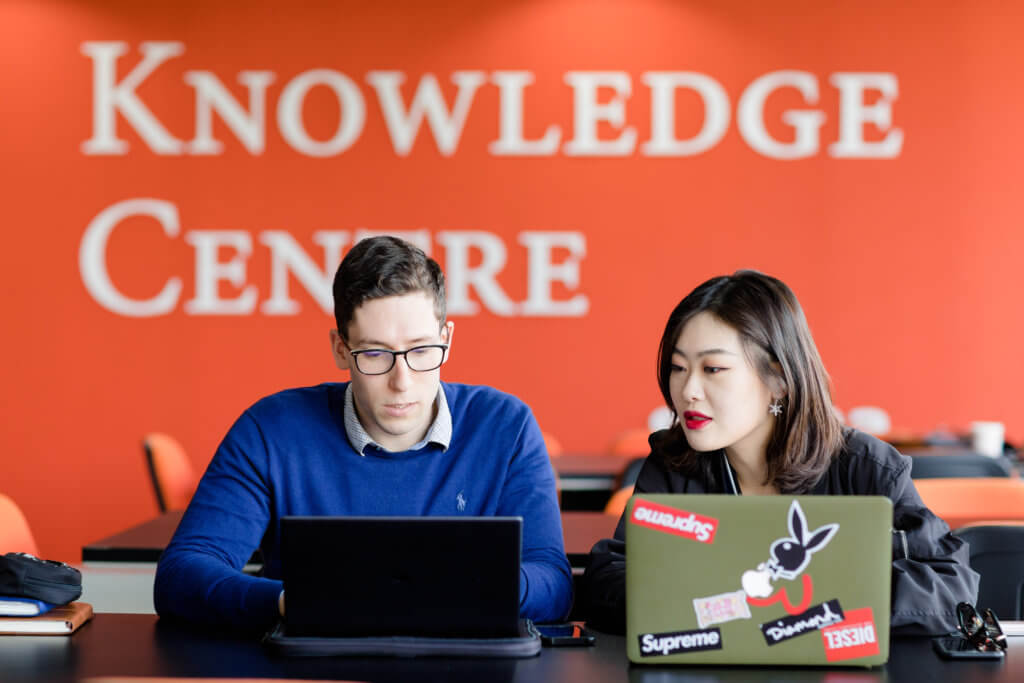After six years of working for a private truck delivery company in France, several factors made Dijon-native Félicien Botrel realise he was ready for a change. To start, he had always dreamt of returning to university to pursue a business-related degree before securing a job abroad. His experience as a professional opened his eyes to the resources lost during the supply chain process and the negative impacts it can have on the environment.
Research led him to SKEMA Business School’s Sophia Antipolis campus. He was immediately sold. “A significant number of international students, the possibility to study abroad for a couple of years, and programme flexibility were exactly what I was looking for,” he says.
His entry ticket was the School’s Global BBA— a four-year undergraduate programme that is truly international. In fact, it follows a North American bachelor’s structure and requires international mobility for successful completion (one to two years abroad).
Students can opt to begin their excursion in one of SKEMA’s six campuses — in France, the US, Brazil and Spain — or at one of their multi-accredited University’s 50 partner institutions in 26 countries. This includes the US, Canada, Australia, or the UK. Botrel’s exchange will begin in September 2022 at KU Leuven in Belgium.

Source: SKEMA Business School
Options abound when designing a Global BBA curriculum as well. Specialisations enrich the programme, enabling students to further explore their interests before landing employment in the sectors of their dreams.
Students can choose from 14 specialisations: Accounting, E-Commerce and Digital Strategy, Luxury Brand Management, Sustainable Development and Social Responsibility, Corporate Finance, Entrepreneurship and Business Administration, Marketing, Global Business, International Business, Supply Chain, Sustainable Innovation, Marine and Environmental Management, Engineering Science and Innovation Management, as well as Artificial Intelligence (AI).
The AI specialisation is ideal for students curious about disciplines ranging from computer science, data science, machine learning, ethics in database use, and the cutting-edge application to business and management made possible by AI technology. Practical knowledge is gained through the recent development of the SKEMA Labs in Sophia, Raleigh and Montreal.However, the basics are never forgotten. Foundational knowledge is gained through General Introduction courses that expose students to the global business environment while helping them develop the key soft skills of critical thinking and communication. Students spend 30 credit hours gaining the know-how needed to assume responsibility across disciplines in both for-profit and non-profit sectors through Management Fundamentals courses.
In their third year, they work towards multidisciplinary excellence by taking on a diverse array of subjects — spanning from the sciences and public speaking to topical matters such as corporate and social responsibility, innovation and the contemporary legal issues that underpin corporate viability. Students will also explore business courses specific to their study location, such as intercultural human resources management, business law, intellectual property courses, and negotiation courses, to name a few.
“The subject diversity of all my classes allows me to acquire skills and knowledge in several fields that I think will be highly valuable in the future,” says Botrel. “There are several classes that have been very interesting in my studies.”
His favourites are “Introduction to Sociology” with Alexandra Saunders, “Academic Research and Writing II” with Christèle Bayoud, and “Environmental Economics and Policy” with Peter Jansen.
The breadth of knowledge they bring to classrooms has inspired Botrel to pursue a postgraduate degree once he graduates. While he has yet to decide what he hopes to achieve professionally, he is sure about securing a sustainability-focused role. With the knowledge he’s gained so far, Botrel is confident of succeeding.

Source: SKEMA Business School
“The knowledge I’ve acquired at SKEMA has helped me understand the practices countries use to make decisions,” he enthuses. “I now understand how they work, and how I can help them limit their impact. I am sure the management skills I have developed at SKEMA will help me to convince and lead both people and companies to play their part in building a better future for the next generation.”
Botrel’s decision to advance his knowledge with an additional qualification is common among Global BBA graduates. However, a majority opt to begin working immediately — simply because they can. Esteemed companies love SKEMA graduates; this includes the likes of Amazon, Bayer, Coca-Cola, Ferrari, Google, PwC, EY, and Tesla.
Wherever they go, they arrive ready to add value thanks to the hands-on exposure they gained as students. Six months of experiential learning is another Global BBA requirement. The Corporate Office assists learners in finding proposals, preparing CVs and nailing interviews.
Meanwhile, budding entrepreneurs will find everything they need and more at the University’s incubator — SKEMA Ventures — which has launched groundbreaking businesses across the globe. After all, “innovation first starts by sharing an idea” is a phrase commonly heard throughout campus. If you have one you would love to see come to life, click here to find out how the Global BBA can help.
Follow SKEMA Business School on Facebook, Twitter, Instagram, YouTube and LinkedIn











